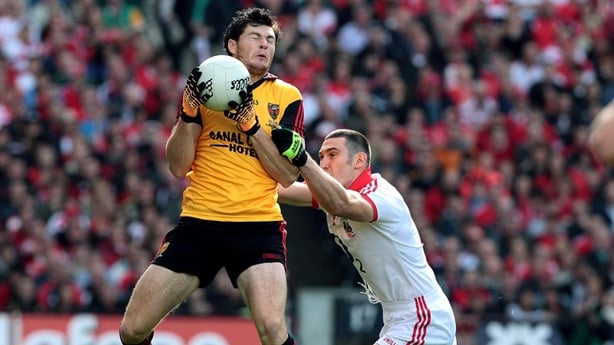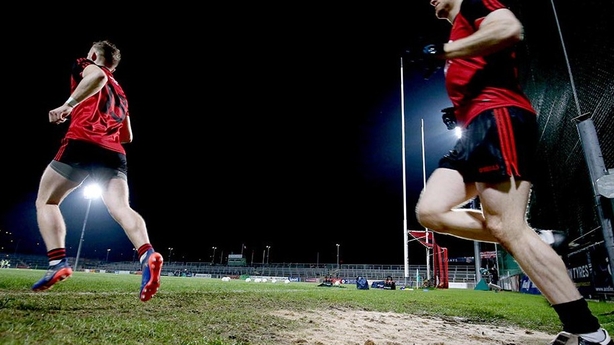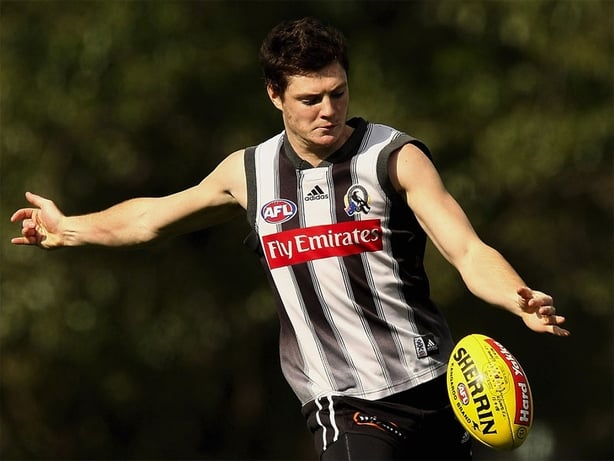Marty Clarke’s reaction to the news that he had been diagnosed with Addison’s Disease was to remain positive.
The 2010 All-Ireland finalist has been forced to call time on his football career due to the endocrine condition, however the 29-year-old admits that he was just relieved to find out what was causing his body so much distress and that the condition could be managed with medication.
"Thank God it was nothing worse," Clarke says was his initial reaction to the diagnosis, which effectively brought to an end his days playing professional Aussie Rules for Melbourne-based Collingwood.
Clarke was enjoying his second spell Down Under when his health deteriorated and his performance levels dropped at the Australian club.
The An Riocht clubman had initially joined Collingwood back in 2007 before returning home to help Down reach the All-Ireland final in 2010, and despite losing the decider to Cork, Clarke was named an All Star.
But on his return to Australia, Clarke knew that something was affecting his ability to train, play and recover, which eventually led to the Addison’s discovery.
"I was diagnosed at the back end of my Australian Rules career," said Clarke, speaking on Radio 1’s Sunday Sport .
"I still had a year left on my contract and I was not feeling well out on the training ground and the harder I pushed myself, the weaker I felt.
"Eventually, I mentioned it to my wife Anna, who is a doctor, and we got some bloods done as we knew that something was not right.
"I had a real bad vomiting episode and I was really weak and just about made it into the hospital and then I got my diagnosis that it was Addison’s Disease."
Remaining Positive
Clarke had never heard of the condition but admits that he was very relieved to be told that it was not a life-threatening disease.
"It was a big shock, I hadn’t a clue what it was, but once I heard that you can manage this condition for the rest of your life with medication, that was all I wanted to hear and I was relieved that my life was not under threat."
It soon became apparent that Clarke’s footy career was coming to an end in Australia but the athlete inside him focused on returning home and aspiring to rekindle his inter-county career with Down.
"My target was to earn another contract at Collingwood but given how poorly I had been performing before I was diagnosed, playing on an empty tank... So my time was up and my performances were poor so it was too big a risk for a club to take.
"When we moved home, I thought I want to play for Down and I want to play at the highest level.
"I was playing with my club, An Riocht, and I was having some good days as captain and playing at centre-half forward."

But Clarke’s exertions with the club side began to take their toll and a gradual reality became apparent that he would never be able to perform at the level required at inter-county level, especially as he realised that the standards back home had greatly improved since leaving for Australia.
"I felt I was playing well but it was the time that it was taking me to recover from games and my mind wanted to do one thing but my body wasn’t allowing me to do other things, and opponents were getting on top of me and I really didn’t have the energy.
"The more and more it went on, the less justice I was doing myself and I knew I was putting my body under stress. It was taking me two or three days after games to recover.
"I went to Croke Park to see the quarter-finals and I just watched Lee Keegan, he’s just one example, he would have been someone that I would have been matching.
"And the condition he was in and how inter-county had pushed on in the few years that I hadn’t played and I just knew then that county level was not going to be reached again.
"It was disappointing but I’m happy with the run I had at the same time.”
Clarke’s naturally positive disposition proved invaluable throughout the entire process and he never got too disheartened dealing with end of his playing career and subsequent retirement.
And the Down man would rather remember the many high points throughout his career that saw him feature in the showpiece match in both codes on either side of the world.
"I do consider myself pretty positive. My initial reaction to the diagnosis was 'thank God it was not something worse' and I continue to have that today."
The Road to Croker in 2010
Clarke recalled the great journey to Croke Park in 2010 with what he considered the "perfect team" and despite falling at the final hurdle, the Kilkeel man has nothing but fond memories of that near-perfect season, with the semi-final victory over Kildare the real highlight.
"The best thing about 2010 was that we had gone a generation without getting to Croke Park and then to be able to be part of a team with Benny Coulter, Danny Hughes, Paul McComiskey and the rest...To take kids back there and get them interested again and get them to Croke Park was certainly a proud moment.
"The highlight was probably the Kildare day, the 2010 All-Ireland semi-final. I remember a few highlights in that game...when Peter Fitzpatrick took the point and we ended up winning. And the joy at that final whistle was fantastic.
"I know it was only a semi-final, and there was a bitter taste after Cork beat us in the final, but that was the one day that probably sticks out for me as a player."
Clarke also admits that the defeat did not affect him too much at the time as he assumed that football finals would be commonplace over the coming seasons, but the more that time moves on the more that he realises the chance that was lost to become an All-Ireland champion.
"At the time, it was just a defeat for me because I expected Down to be up there for the next few years but the longer it goes and especially now that I have finished playing, to get that close was pretty disappointing.
"We got close, we got it back to a point but time ran out and we also lost Down’s 100% record in All-Ireland finals, we were five from five before that so it was disappointing.
"And we were wearing those yellow jerseys as well, which I wasn’t a big fan of so.
"Looking back it was a tough one at the time as it was for the supporters."

That perfect team that Clarke alluded to was missing a key component in the final as he felt the loss of Ambrose Rogers through injury gave Cork a real edge in midfield on the day.
"We were almost the complete package, we had a great system and we had great individuals and the key moment was losing Ambrose Rogers.
"He was our star midfielder and true leader of that team and unfortunately he did his cruciate and we missed him in the final as Cork got on top of us."
What Future for Down Football?
Clarke’s prophecy would not ring true and Down have not made it back to Headquarters in September since the 2010 outing and the An Riocht man feels that other counties have stolen a march on the Mourne men.
Down have made a promising start to this season’s Allianz League campaign but Clarke feels that the panel need a real goal to focus on to bring the squad forward over the next few years.

"There is no doubt that Down have the players but other counties have developed more rapidly and Down have been left behind.
"I think the target should be to win the Ulster Championship, as 1994 is the last time Down has won a senior title and it needs to be a goal.
"The manager said, if you aim for nothing, you are certain to hit it and I think Down are a bit of a victim of that at the moment."
Clarke also sees lots of similarities with the current crop of GAA players, who he believes have possibly surpassed their Australian counterparts in their overall athletic ability.
"They are very similar sports, the way they train, the drills they do and the weight training, which initially was the big difference when I went out there.
"Now I believe the GAA athletes are better rounded than the Australian boys as the Aussie game is heading towards a running game and the tactical changes are very different.
"I could express myself much more in GAA, while I just had to fill a role in Australia, run lines and it was very tactical."
No Regrets for the Australian Adventure
On a personal front, Clarke has nothing but great memories of his time in Australia, where he got paid as a professional footballer and living a remarkable life for someone who had never left the country before trying out for the Pies back in 2007
"The experience was fantastic. It was a big gamble and I just jumped on the plane to see what happened. It went unbelievable well and I stayed out there for two and a half years.
"There are so many similarities in the dressing room, the only difference was you were getting paid.
"And that was good as well, to be able to be rewarded for playing well and to set yourself up financially, which I was able to do to a certain extent.

"For the hard graft, the injuries, the defeats and the abuse you sometimes take from the supporters, it was nice to get compensated and not have to go out to work and worry about when you are going to get your training in so I was really fortunate because the lifestyle was fantastic and the facilities were first class.
"I had never left Ireland, and then I was all over the world training with Collingwood, at high altitude in Arizona and we were down at the Grand Canyon and things like that.
"Although I never won an All-Ireland or a Premiership in Australia like Tadhg Kennelly, I had a similar experience in that I could play in the grand final in both codes.”
So what now for the 29-year-old who admits that he is not sure what the future holds as he has returned to education to complete a sport’s-based degree?
"I have diploma in sports management from Australia and I am doing a degree around sport and coaching so that is a road I may go down.
"Hopefully, something will turn up and potentially management further down the line once I cut my teeth at club level."

